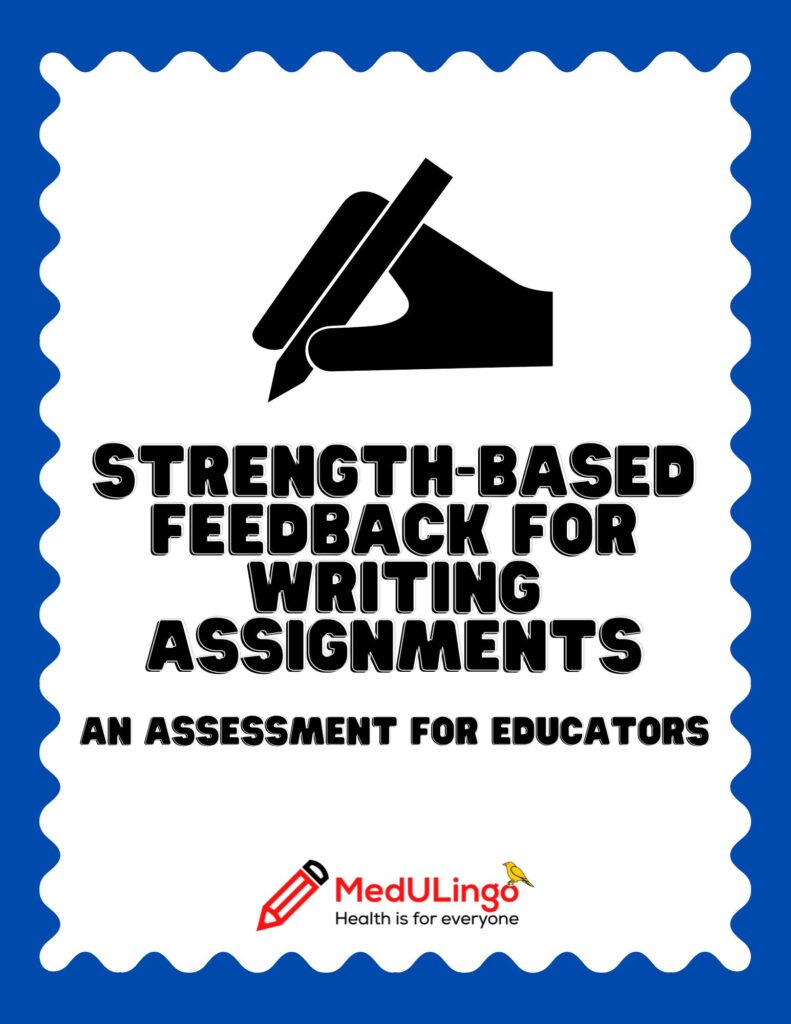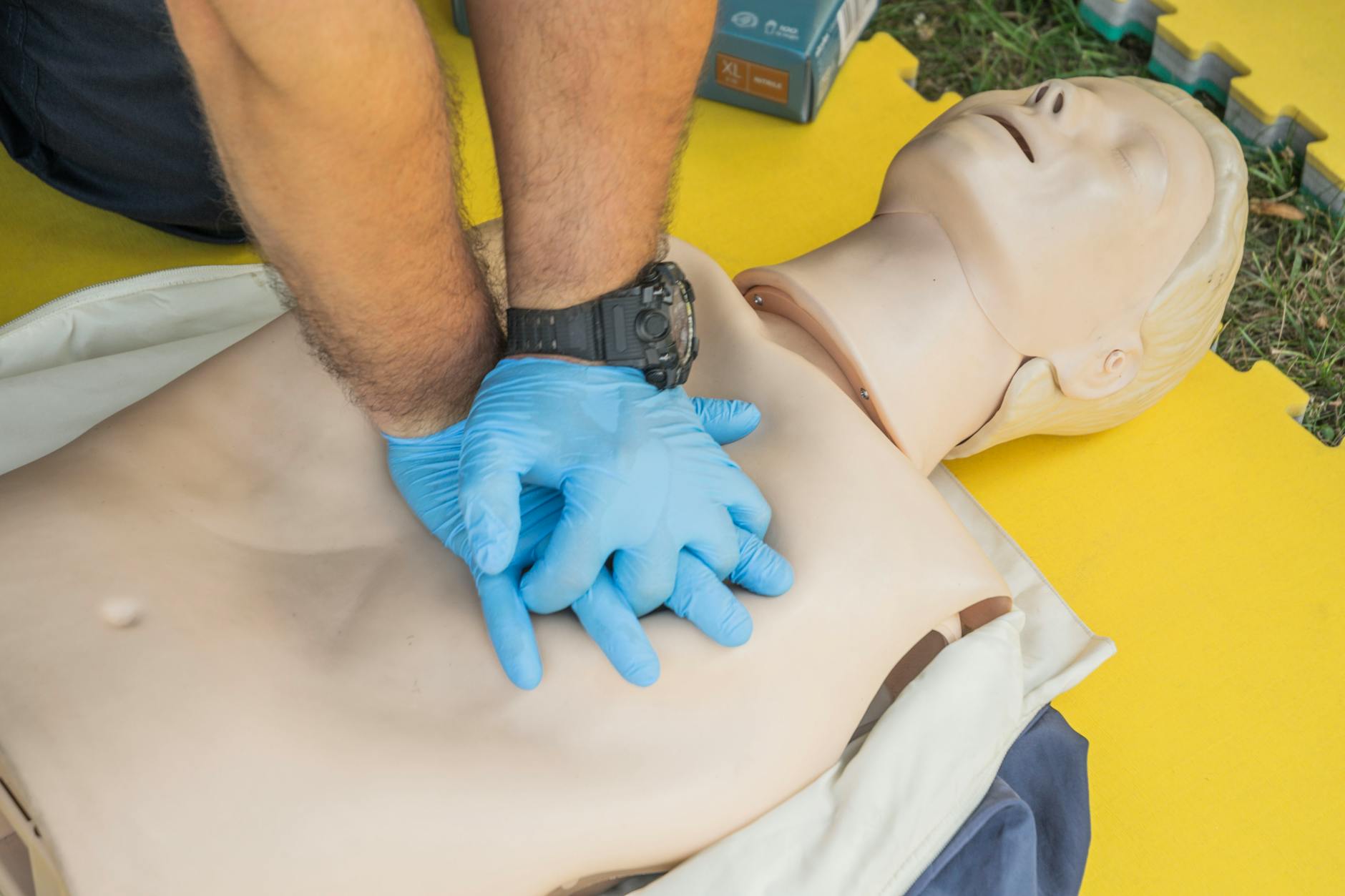Strength-Based Feedback for Writing Assignments: An Assessment for Educators prioritizes asset/strength-based approaches and feedback. Assessment, whether formative or summative, should not only be of learning, but also for learning. This means that educators have a responsibility to make day-to-day adjustments to teaching based on assessments and provide feedback that moves learners forward (William, 2018). Not all educators believe they have a responsibility to help students to achieve mastery in their writing through assessment activities, however educators should be encouraged to undertake professional development on strength-based approaches to equitably improve student achievement related to writing and avoid causing harm with deficit approaches (McClure & Reed, 2022). This is especially relevant for post-secondary educators because writing skills are assessed and necessary across many disciplines at all levels of academia.

Deficit-based language in feedback, or absence of corrective or instructional feedback in some cases, can be worse for students than no assessment at all. Feedback that focuses on mastery of learning goals is beneficial to learning, but feedback that focuses on grades, granting or withholding rewards, or fostering self-esteem may be ineffective or harmful (Pellegrino et al., 2001). Moreover, deficit thinking can do harm and is contradictory to approaches which recognize the assets and strengths of students who resist normative and oppressive standards and environments to survive (Reyes & Duran, 2021; Yosso, 2005).
Whether feedback should be provided for formative or summative assessment may depend on the content and the context. However, if a student is never going to do a particular assignment again, feedback specific to that assignment is not helpful if it is not transferrable to any other assignment. Therefore, feedback should provide what students’ need for future purposes (William, 2018). If the content addresses life skills, such as driving, cooking safety, or first aid, the assessment should not only perform objective measurement but also offer corrective feedback. Students should be instructed on how to better and safely perform the life skills whether it be part of a formative or summative assessment. For example, a driving examiner should not only tell an examinee that they have parked incorrectly as a reason for failing the exam (and having rewards withheld), but also tell them exactly how they should have parked (whether the student passes or fails the exam). Even if it is a summative assessment for objectively measuring skills and determining whether the student should pass or fail, assessors have a social responsibility to provide feedback related to safety matters which may be beneficial to the individual and to society over the long term.
Although writing is a not a procedural safety skill, post-secondary students require writing mastery as a survival skill for professional advancement, and educators or assessors can improve student achievement by providing constructive, growth-oriented, strength-based writing feedback to students. Feedback that is relevant and transferrable to future writing assignments may be helpful to students whether it be part of formative or summative assessment.
However, deficit-based language in feedback may be ineffective or harmful no matter the assessor’s perception of the transferability or usefulness of the feedback. Imagine if the driving student passed their exam, but the driving instructor told the student that they parked incorrectly without providing any further information about how they should have parked. Similarly, if an assessor provides a student with deficit-based feedback about their writing such as “this is not to the standard of an A” or “you need to believe in yourself”, (e.g. focusing on grades or fostering self esteem) without any constructive instruction, the student is not likely to perceive this feedback to be transferrable for future use nor beneficial, no matter the assessor’s intentions. Moreover, the student may feel discouraged, demoralized, or wronged, or they may even reject this feedback. In both cases, asset-based approaches and strength-based feedback could enhance the student experience and improve student performance.
Personally, I have become more interested in advocating for strength-based approaches after experiencing ineffective or harmful teaching and assessment by healthcare professionals. For example, in one instance when I was being assessed on first aid skills, the assessor told me that I was not performing the skills adequately, but would not provide any helpful correction nor instruction. At that time, I had no easily accessible means to find out how to properly perform the skills and so I never learned what it was that I did wrong. To this day, I still do not know what I did wrong in that assessment. The feedback provided by the assessor was focused on whether I would pass or fail (i.e. granting or withholding rewards) and was demoralizing. Although I understood the importance of objective measurement and evaluation for the purpose of this summative assessment involving first aid skills, I concluded that the assessor did not want me to know how to properly save a person’s life in the event of an emergency.
A few years later, however, I became a medical student and found myself conflicted about the pervasive deficit-based language and culture in the profession. Phrases like “don’t waste a spot”, “this student isn’t devoted/dedicated”, “you should be grateful”, or “you are the last person who should be a doctor” are common in medical education spaces. One assessment in my program involved feedback to students like “you are at 20% of the level of a full-fledged physician”. (You may be interested in Strength-Based Language for Medical Educators.) At the time, I did not have an awareness of deficit-based language, however I did recognize that my assets and strengths were not recognized, nor could they be appropriately utilized in that program, not even to challenge or resist the oppressive environment. In medical education, I was to be dehumanized as an empty vessel and filled with knowledge, skills and values to produce the “ideal physician”, however as Morgenstern (2025) discusses, there is no single definition for an “ideal doctor”. As I began to understand the implications for students, and also for patients, of being treated as an incompletely-filled pail, I recognized the deficit based language as harmful. It certainly weighed on me and affected my mental health as a then student to-be physician.
According to McClure & Reed (2022), deficit judgments can continue to harm students long after they leave school, and this was certainly the case for me after I left medical training. Since I have gained awareness about deficit-based language and asset/strength-based approaches, I have been able to somewhat unlearn student blame (McClure & Reed, 2022) for disagreeing with normative expectations in medicine. This has been both emancipatory and empowering for me as both a student and as a patient, and this motivates me to push back on deficit thinking in higher education as suggested by Reyes & Duran (2021) with anti-deficit or asset/strength-based approaches.
Strength-Based Feedback for Writing Assignments is an assessment for cultivating strength-based feedback and mitigating deficit thinking which should support inclusion of minority students and advance their writing skills. Educators themselves should also be empowered by the knowledge and skills they gain to improve students’ mastery in writing and opportunities to advance their own practice through professional development and continuous improvement. Many educators may have also been subjected to deficit-based feedback during their careers, and may benefit from gaining awareness about asset/strength-based approaches which allow them to address blame from deficit judgments (McClure & Reed, 2022). This is an assessment that I would want as part of my own professional development as an educator to equitably support students and promote mastery of learning outcomes.
References
McClure, B., & Reed, K. (2022). Hacking deficit thinking: 8 reframes that will change the way you think about strength-based practices and equity in schools. Times 10 Publications.
Morgenstern, J. (2025, April 14). Providing feedback and defining excellence in medicine, First10EM. Available at: https://doi.org/10.51684/FIRS.141280
Pellegrino, J. W., Chudowsky, N., & Glaser, R. (2001) Knowing what students know: the science and design of educational assessment. National Academies Press. https://research-ebsco-com.edgewood.idm.oclc.org/linkprocessor/plink?id=5212fcda-9473-3c1a-8eed-33961bbf2f8b
Reyes, H. L. & Duran, A. (2021). Higher education scholars challenging deficit thinking: An analysis of research informed by community cultural wealth. Journal of Critical Scholarship on Higher Education and Student Affairs, 6(1) https://ecommons.luc.edu/cgi/viewcontent.cgi?article=1171&context=jcshesa
William, D. (2018, September 11). What do we mean by assessment for learning?. YouTube. https://www.youtube.com/watch?v=q-myBw36_DA
Yosso, T. (2005). Whose culture has capital? A critical race theory discussion of community cultural wealth. Race Ethnicity and Education, 8(1), 69–91. https://thrive.arizona.edu/sites/default/files/Whose%20culture%20has%20capital_A%20critical
===
Interested in teaching medical literacy pain free? Shop medical literacy resources!

This article was written by Joan Lee Tu, the founder of MedULingo.com.
You may also be interested in the following:
Improving Inclusivity in Medical Learning Environments
Strength-Based Language for Medical Educators
Strength-Based Feedback for Writing Assignments: An Assessment for Educators
Medical Literacy for Older Learners Handbook for Curriculum and Instruction
50 Strength-Word Coloring Sheets – FREE DOWNLOAD
9 Strength-Based Reframes for Neurodivergent Learners – FREE DOWNLOAD
Spicy Meltdowns: A Story About Buckets, Pots, and Neurodivergence
Spicy Small Talk and Other Stories
Strength-Based Writing and Feedback for Medical Education
The Role of Strength-Based Language in Medical Literacy Education
The Case for Change: Concerning Aspects of Deficit-Based Language in Education
Strength-Based Language: Empowering STEM Learners
Strength-Based Language: Empowering Narratives in STEM Education

